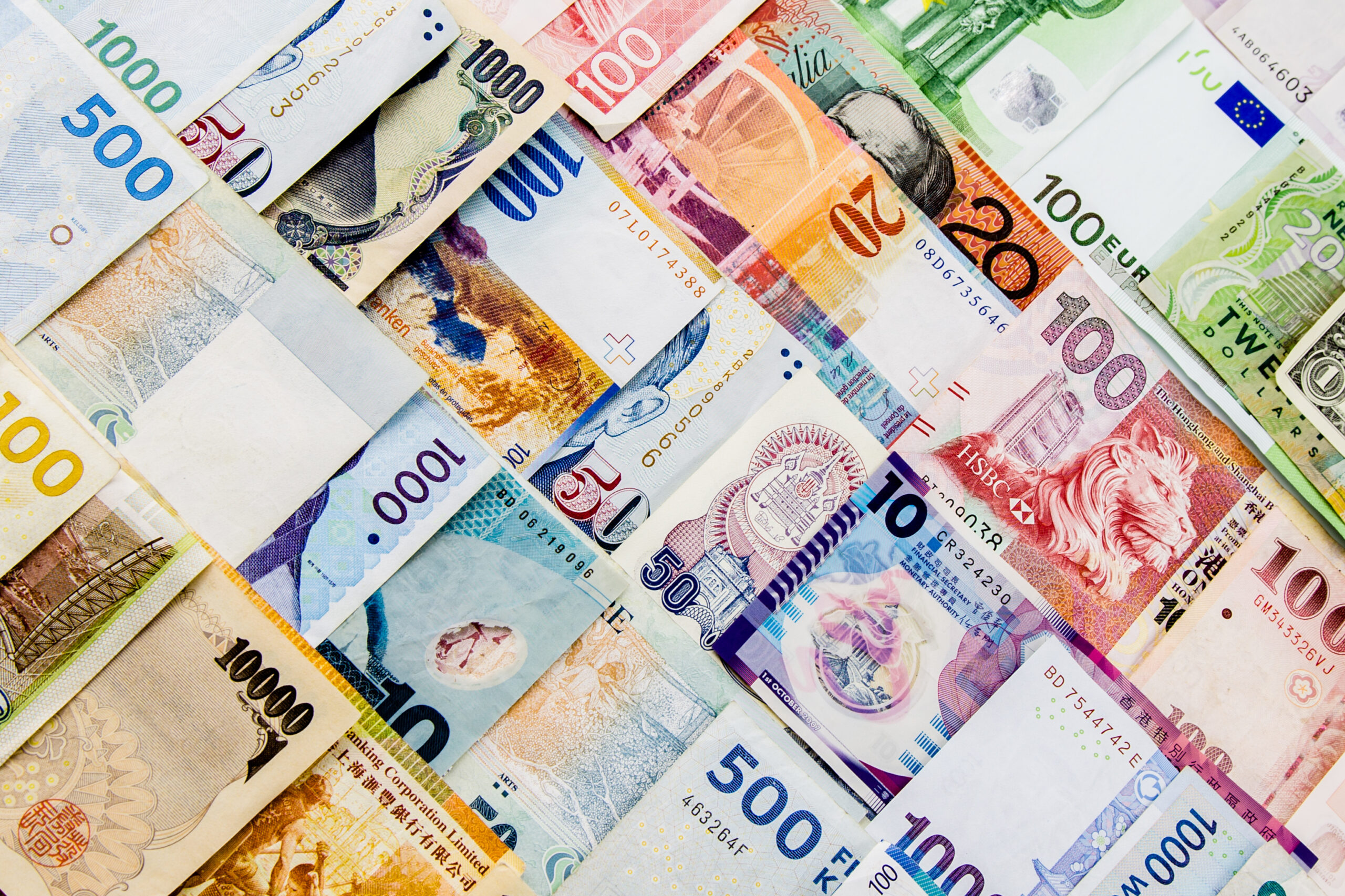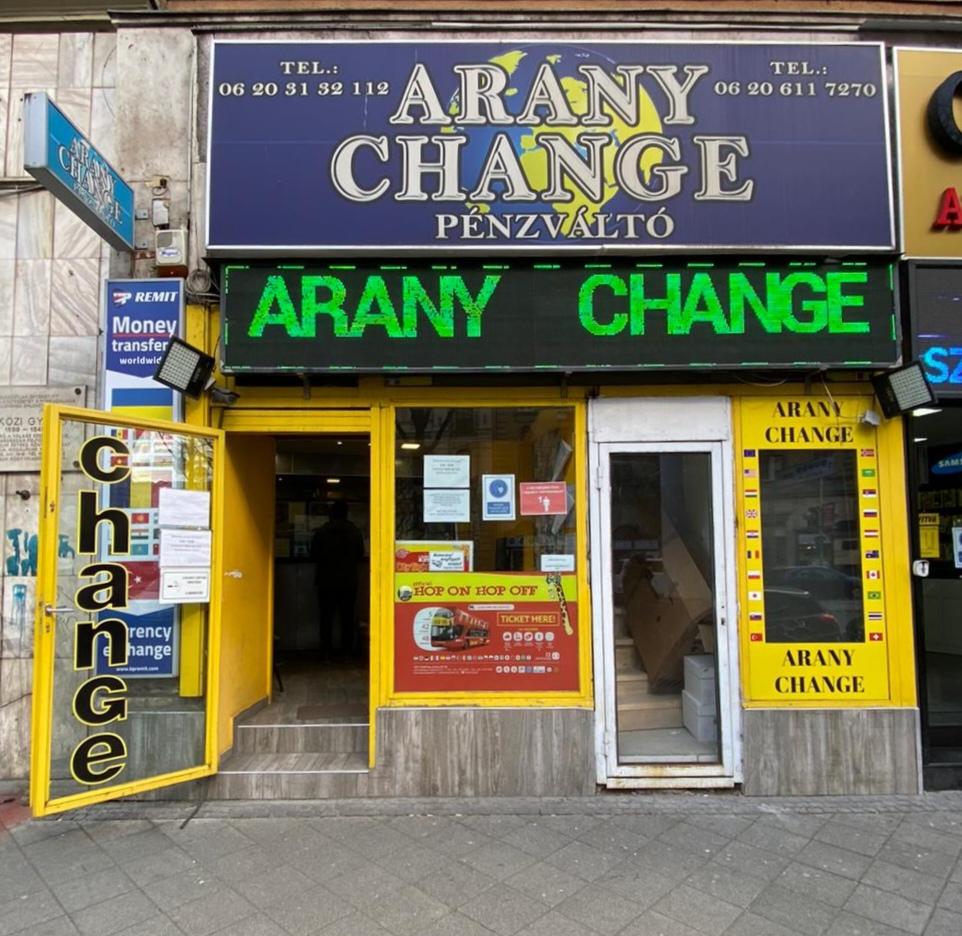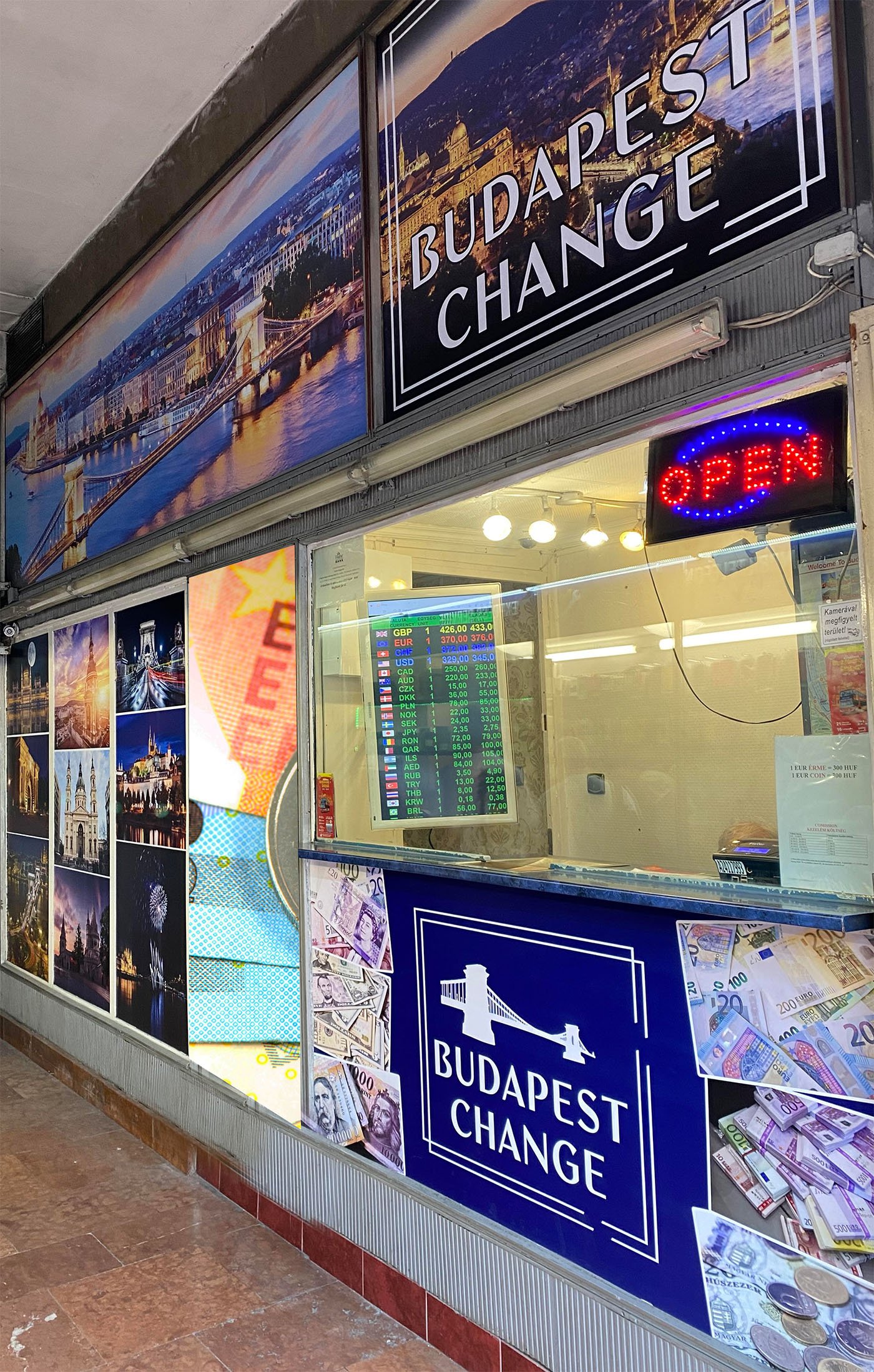Students can exchange money by either visiting a mall that has an exchange office or by searching and visiting an exchange office alongside the line of Tram Line 4-6 on the Pest side of the city. This line includes 4 interconnected boulevards: József körút, Erzsébet körút, Teréz körút, and Széchenyi István körút.
The best way to find a perfect exchange office is to type ‘pénzváltó’ or ‘pénzváltás’ in Google Maps, and browse the results. If the rating of an exchange office is higher than 4.0 or even 4.5, then it’s highly likely you’ll be satisfied with the service.
On average, it can cost around 100 to 1500 HUF (0.25-4 EUR) to exchange money. The minimum commission is 0.3% by law. The highest price of currency exchange is always maximized in around 7800-10000 HUF / 20-25 EUR, especially in case of large sums (hundreds of thousands of forints, or even millions)
Cash and coins can come especially in handy when you want to tip a bartender, go to a public toilet, or print some documents in a printing office.
Pro tip: look for those exchange offices, which don’t communicate vehemently ‘No commission!’. These offices typically try to hide a higher exchange rate by operating with higher prices. Opt for those offices, which communicate openly about their fees!
But first, let’s start with Hungary’s official currency, shall we?
What is the official currency of Hungary?
The official currency of Hungary is Forint (sign Ft; code HUF). Forint was introduced in August 1946 in Hungary, changing the previous currency called ‘Pengő’. It is named after the city of Florence, where golden coins had been minted since 1252.
What banknotes and coins are in circulation in Hungary?
Currently, there are 6 types of coins and 6 types of banknotes are in circulation in Hungary. The value of these 6 coins are the following.
- 5 HUF
- 10 HUF
- 20 HUF
- 50 HUF
- 100 HUF
- 200 HUF
The values of the 6 banknotes in Hungary are the following.
- 500 HUF
- 1000 HUF
- 2000 HUF
- 5000 HUF
- 10000 HUF
- 20000 HUF
You may ask yourself: How can I check if a banknote is real? It’s highly unlikely that you’ll stumble upon counterfeit money, but here are some ways you can check if a banknote is real. The first step is to hold the paper banknote towards the sun.
- The letter “H”: There should be a fragment of the figure in the upper right corner that will be expanded by the “missing pieces” thus creating the letter “H”.
- Watermark: If you see the reflection of the historical person in a smaller version on the opposite side of the banknote, then the banknote is real.
- Hologram foil: There is a so-called Hologram foil right to the watermark. If the banknote is genuine, you’ll see a tiny metallic mark.
- Security thread: You should see a dark line running alongside the official coat of arms of Hungary on the shorter side of the banknote.
- Forint App: If you are cautious, then download the Forint App from the Google Play Store or Apple’s App Store. Then you can authenticate a banknote by using the camera of your mobile phone.
Where can I find currency exchange offices in Budapest?
You can find most of the currency exchange offices at 2 major locations in Budapest.
- Malls: there is always a currency exchange office in every mall in Budapest
- Alongside Tram Line 4 and Tram Line 6 on the Pest side. This line includes József körút, Erzsébet körút, Teréz körút, and Szent István körút. These 4 boulevards are all interconnected. Most of the currency exchange offices of Budapest are here.
Where can I exchange money in Budapest?
You can find many exchange offices in malls and alongside Tram Line 4 and Tram Line 6 on the Pest side of the city.
The best way is to type ‘pénzváltó’ or ‘pénzváltás’ in Google Maps and start browsing the results. If the ratings of a currency exchange are above 4.0, or even 4.5, then it will most likely satisfy your needs with professional service. But here are some currency exchange offices in Budapest that we recommend.
Change 32
Address: Harminckettesek tere 2, 1082 Budapest
Opening hours: 9:00 am-5:15 pm
Located in the proximity of ELTE and the Fővárosi Szabó Ervin Könyvtár, which is a beloved spot for students, who want to study in silence. This exchange office is close to many shops and restaurants, as well.
PrimaChange
Address: Múzeum körút 7. and Múzeum körút 10., 1088 Budapest
Opening hours: 8:30 am-8:00 pm
Located close to many universities, including ELTE and Corvinus. Perfect if you want to run an errand of changing money between two classes. Or if you are waiting for the 100E Airport Bus, which has 2 stops in its vicinity.
Correct Change
Address: Budapest, József körút. 40, 1085 Magyarország
Opening hours: 8:00-7:00 pm
Sitting in the proximity of ELTE and Rákóczi tér, which is a stop of Metro line 4. There are also many amazing cafes and restaurants nearby.
Korona Change
Address: Teréz körút 35, 1067 Budapest
Opening hours: 9:00-7:00 pm
Korona Change is located between Oktogon and Nyugati Pályaudvar (railway station). So it’s pretty easy to travel there by either tram 4-6, or by using Metro Line 3, which stops at the railway station.
Expert Change
Address: Teréz körút 56, 1066 Budapest
Opening hours: 9:00-7:00 pm
Expert Change lies right at the heart of Oktogon, one of the most beautiful (but quite busy) parts of Budapest. If you want to visit a museum nearby, for instance, the House of Terror Museum, have a coffee nearby, sit in a restaurant, or just want to grab a quick meal at one of the fast food chains, then it’s your perfect spot for currency exchange.
How much does it cost on average to exchange money in Budapest?
The average cost of exchanging money ranges from 100 HUF to 1500 HUF (0.25-4 EUR), but fortunately, it’s always maximized at around 7800-10000 HUF (20-25 EUR). It depends on the actual service provider and branch. There is a mandatory minimum of 0.3% commission by law. Some exchange offices also add handling fees to the total cost of the exchange.
Ask for the fees and commissions at the branch in advance before you exchange money!
When can cash and coins come in handy in Budapest?
Cash and coins can come in handy in the following situations.
- You want to tip a bartender, a taxi guy, a pizza delivery guy, or a waiter/waitress. Although, you can tip a bartender and waiter also by card. But if you give them cash, then it’s 100% that it goes to them. 🙂
- In some smaller restaurants you can only pay in cash.
- You need to go to a public toilet. These cost around 200-250 HUF and can only be paid in coins.
- You need to print some documents.
- You purchase something in a store, which costs less than 1000-1500 HUF. In these situations shop owners tend not to like/or let you pay by card.
- You want to go to the market to buy some fresh vegetables or fruit. Even though you can pay by card in markets, a lot of places don’t accept cards, or don’t let you use a card if the total sum of your purchase is less than 1000-1500 HUF.
- In some minor museums and at some landmarks you can only pay in cash.
You may ask yourself: Is cash accepted everywhere in Budapest? Yes, cash is accepted basically everywhere in Budapest.
Are slightly damaged Hungarian banknotes still valid?
Yes, slightly damaged Hungarian banknotes are still valid and accepted. However, damages like deeper cuts, or missing pieces tend to render that banknote void. So take care of your banknotes!
How much cash should I keep in my wallet in Budapest?
It is recommended to keep around 10000-25000 HUF (25-63 EUR) in your wallet. Most of the time you won’t need it, but if the occasion arises, this sum should be more than enough.
Can I pay in Euros in Budapest?
Yes, you can pay in Euros in Budapest. Despite the fact that Hungary is not a member of the Eurozone, as an EU Member EUR is accepted in the country. However, it’s not recommended to pay in Euros, as you may lose some money on the exchange rate.
Tips to avoid scam exchange offices
Most of the exchange offices are completely fair and don’t try to scam you. But there are some tricks they tend to apply when it comes to currency exchange. Petty thefts and scams are typical, despite the generally good public safety in Budapest. We recommend keeping an eye on the following tricks.
- Sometimes exchange offices tend to use a “swapped” HUF/EUR exchange rate instead of a EUR/HUF rate. Like ‘0.0025 HUF/EUR’, instead of ‘400 EUR/HUF’. This rate looks fairly low, however, it’s not necessarily true. With this tactic exchange offices hide an exchange rate that is way higher than the Hungarian Central Bank’s middle rate.
- The exchange rates at the exchange offices are NEVER the same as the middle rate issued by the Hungarian Central Bank. This is perfectly normal, it is the core of their business. Check the official middle rates first by searching for ‘eur huf exchange rate’ in Google, and then use this reference rate when choosing a service provider.
- Some exchange offices tend not to communicate transparently about their fees and costs. Always look for such information, and if you don’t find it, ask the owner! Or ask him to point you to the official written information about fees. Thus avoiding a potential scam.
- It is wise to avoid those exchange offices that vehemently communicate ‘No commission!’. In such cases, commissions are hidden in their actual charge. Opt for exchange offices that openly and transparently communicate about their prices!
- If you don’t understand how a commission is calculated, ask! Even better to go with a local who speaks Hungarian, in case the business owner tries to act like he/she doesn’t speak English.
- It can never hurt to ask for a receipt! 🙂





